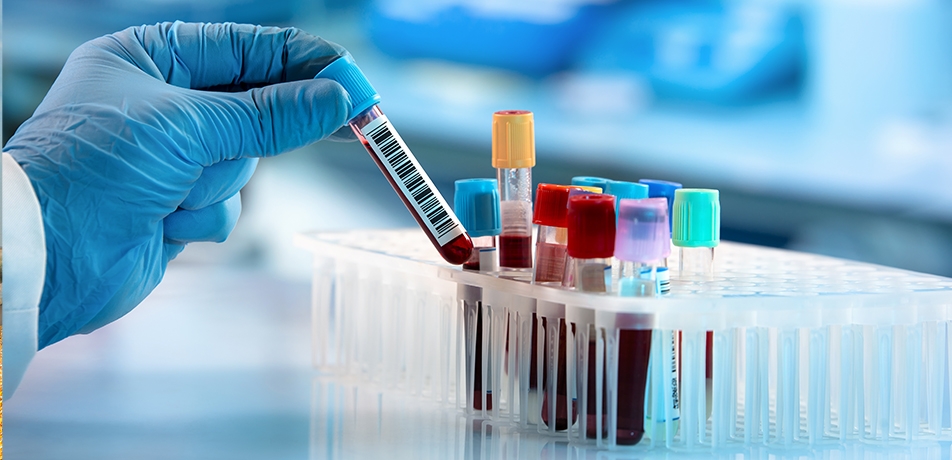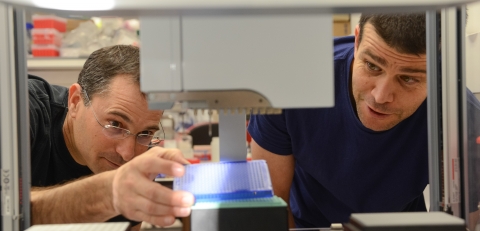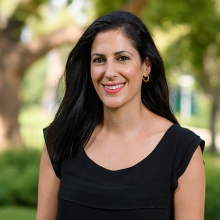Biomarkers in the blood
Big data is brought to bear on multiple myeloma
Features

Recent findings by Weizmann Institute scientists and physicians across Israel are helping to advance treatment for multiple myeloma (MM), the second most common blood cancer worldwide.
MM is a cancer of plasma cells, a type of white blood cell normally responsible for producing antibodies and fighting infection. In this disease, the body overproduces plasma cells in the bone marrow, and these cells in turn produce abnormal antibodies that build up in the bone marrow and can thicken the blood or damage the kidneys. Although symptoms are minimal in the early stages of the disease, when advanced, MM can lead to bone pain, bleeding, frequent infections, and anemia. MM is considered treatable, but not curable.
Weizmann Institute scientists are leading efforts to understand and overcome MM. Some of their most recent findings are truly groundbreaking—paving the way not only towards more personalized monitoring of disease status, but also potentially rendering such monitoring far less painful and far more informative than ever before.
Better health through data mining
A major challenge facing multiple myeloma patients and their physicians is that the disease often persists in a pre-cancerous watch-and-wait stage for an indeterminable time; every year, one percent of these patients develop full-blown myeloma disease. However, it has been all but impossible for physicians to predict whose disease will transform using existing blood tests, leaving everyone to wait and worry.
Now, scientists are fusing number-crunching with biology to better identify MM patients—before the disease becomes symptomatic. In a project spearheaded by Weizmann Profs. Ido Amit and Amos Tanay, and in collaboration with physicians in hemato-oncology hospital departments across Israel, the scientists identified a very small number of malignant cells in what is considered a pre-malignant stage of MM, out of tens of thousands of cells surveyed in a single sample. But some proportion of these patients did not have these pre-malignant cells. The scientists carried out this research using a highly sensitive method of scanning blood and bone marrow cells at the individual cell level, using a technology called single-cell RNA sequencing.
Prof. Amit is a member of the Department of Immunology, and Prof. Tanay of the Departments of Biological Regulation and of Computer Science and Applied Mathematics. This project was facilitated by Prof. Gabi Barbash, head of the Institute’s Bench-to-Bedside Program.
As a result of the team’s breakthrough, it will be possible to follow and monitor patients with simple blood tests, rather than significantly more painful bone marrow biopsies. Moreover, this approach will allow for more informed, personalized, and early treatment choices, not only for MM, but potentially for other types of cancer as well. These significant results were recently published in Nature Medicine.
“Until now, the methods we developed for single-cell genomics sequencing were confined to a small number of research labs,” says Prof. Amit. “We are constantly pushing the boundaries of the technology in ways that will make it a major clinical discovery and diagnostics tool.”
The ultimate goal is to develop an accurate risk assessment of these pre-malignant presentations, create better predictive models and diagnostic markers for MM and pre-malignant states, and gain a more refined understanding of disease progression. The researchers anticipate that this work will lead to improved classifications of sub-populations of patients, and thus better target aggressive care to those patients at highest risk, while reducing unneeded treatment for those patients at lower risk.
This Weizmann Institute-led project is the first of its kind in Israel—a coordinated, multi-center clinical genomic study with a consortium of major hemato-oncology departments throughout the country. And more are on the way, including a recently established consortia of Weizmann Institute scientists and leading Israeli rheumatologists, who will join forces to investigate rheumatoid arthritis.
A SLAM dunk
Because bone marrow is the primary niche in which myeloma cells thrive, Prof. Idit Shachar from the Department of Immunology is examining the molecular messages passed between malignant MM cells and the surrounding environment. Her goal: to identify ‘chinks in the armor’ that may serve as targets for new, drug-based approaches to MM treatment.
Prof. Shachar’s MM research focuses on a family of cell-surface receptors which play an essential role in the transmission of the molecular messages that promote cancer progression. This family of receptors is called SLAM (signaling lymphocyte activation molecule).
As demonstrated by her recent research, one receptor associated with the SLAM family is of particular importance, as it promotes the survival of the cancerous plasma cells in MM. Called CD84, this receptor may also point toward a new strategy for MM treatment. Her team’s study showed that CD84 acts as a bridge between malignant cells and cells in the microenvironment, which support malignant cell survival. Therefore, CD84 is an attractive target for therapy.
“It is my hope that this research will pave the way towards treatment strategies that interrupt CD84-induced pathways that would otherwise help MM cells survive chemotherapy,” says Prof. Shachar.
She plans to continue her examination of the cross-talk between MM cells and the surrounding tumor microenvironment, as well as the regulation of immune cells in this niche. With such promising results from these experiments, Prof. Shachar hopes that this work will form the basis of more targeted and less toxic therapies for this widespread and life-threatening disease.
Prof. Ido Amit is supported by the Adelis Foundation, the BLG Trust, the Estate of Ruth Drobnes, the European Research Council, the Alan and Laraine Fischer Foundation, Drs. Herbert and Esther Hecht, the Estate of Lydia Hershkovich, Carla Hunter and Andre M. Schub, The Kekst Family Institute for Medical Genetics, the Helen and Martin Kimmel Award for Innovative Investigation, Isa Lior, the Rising Tide Foundation, the Eden and Steven Romick Postdoctoral Fellowship Fund, the Anita James Rosen Foundation, the Steven B. Rubenstein Research Fund for Leukemia and Other Blood Disorders, the Sagol Institute for Longevity Research, the Estate of Simon Saretzky, The Felix and Silvia Schnur Endowment Fund in Stem Cell Research, the Estate of Alice Schwarz-Gardos, the David and Fela Shapell Family Foundation INCPM Fund for Preclinical Studies, the Thompson Family Foundation Alzheimer’s Research Fund, and The Wolfson Family Charitable Trust.
Prof. Amos Tanay is supported by David and Molly Bloom, the European Research Council, the Estate of Lydia Hershkovich, the Helen and Martin Kimmel Award for Innovative Investigation, Barry and Janet Lang, the Ilana and Pascal Mantoux Institute for Bioinformatics, The Ruth and Samuel Rosenwasser Charitable Fund, the Edmond de Rothschild Foundations, the Steven B. Rubenstein Research Fund for Leukemia and Other Blood Disorders, the Estate of Alice Schwarz-Gardos, the William P and Gertrude Schweitzer Foundation, Prof. Amnon Shashua, and The Wolfson Family Charitable Trust.
Prof. Idit Shachar is supported by The Nella and Leon Benoziyo Center for Neurological Diseases, The Judy and Bernard Briskin Multiple Myeloma Research Project, the Joel and Mady Dukler Fund for Cancer Research, the Steven Gordon Family Foundation, the Quinquin Foundation, the Rising Tide Foundation, and the Steven and Beverly Rubenstein Charitable Foundation. Prof. Shachar is the incumbent of the Dr. Morton & Anne Kleiman Professorial Chair.

L to R: Profs. Ido Amit and Amos Tanay

Prof. Idit Shachar








